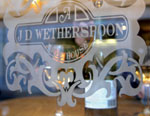 With plans to open 30 pubs over the next five years, JD Wetherspoon is set to impose its low-cost brand on an Irish pub sector traditionally dominated by independents.
With plans to open 30 pubs over the next five years, JD Wetherspoon is set to impose its low-cost brand on an Irish pub sector traditionally dominated by independents.
The chain, which owns more than 900 pubs across the UK, is spending €50m (£36m) acquiring sites in a country it had abandoned a decade earlier for being too expensive.
Last year Wetherspoon opened its first two pubs in south Dublin, the Three Tun Tavern in Blackrock and the Forty Foot in Dun Laoghaire. In a move to focus resources on strong urban centres, it has so far acquired five more sites – in Cork, Waterford, Swords, Blanchardstown and the former Camden Hall hostel on Dublin’s Camden Street.
Wetherspoon’s (Northern Ireland-born) founder and chairman, Tim Martin, insists that the first two pubs are trading extremely well and intends to announce further openings soon.
He says: “We’ve always been keen on expanding into Ireland, but when we first looked a few years back the prices were silly. Now, although property prices are still high, they are not as exorbitant as they were a decade ago and the economic conditions are more favourable.”
In 2003 Wetherspoon reportedly spent €2.6m purchasing a pub on Caper Street in Dublin, only to resell it at a loss after deciding the cost of doing business in the Republic was too high for it to afford a decent-sized portfolio.
Since those heady days of the Celtic Tiger boom, prices have tumbled. Although capital values are now finally rising, figures from Irish agent Morrissey’s show the average sale price of a Dublin pub was €1.14m last year, compared with €3.1m in 2003.
Indeed, the Irish pub sector has suffered a painful hangover since recession hit. Almost 1,000 pubs closed across the country between 2007 and 2012 as a consequence of economic downturn, a fall in alcohol consumption and the lure of cut-price supermarket alcohol.
Battling back
Yet the likes of Wetherspoon are encouraged by suggestions the market is finally on the comeback. Transaction activity has dramatically increased for the first time since the sector’s 2006 peak.
According to Morrissey’s, 46 pubs changed hands across the Greater Dublin market in 2014, an increase of 130% on the previous year. Albeit from a low base, capital values also increased – by almost 250% – and the average sale price rose by €380,000.
“It seems the sector is slowly starting to recover,” says agent Tony Morrissey from the Dublin family firm. “The economy is improving and confidence is coming back to the market. People feel more secure in their employment and are prepared to go out more.”
Morrissey adds: “Liquidity is returning to the market and after years of distressed selling, we are finally seeing more consensual transactions.”
Irish publicans are looking at opportunities to add value to well-located assets, while potential entrants are encouraged by fairer pricing.
CBRE director John Ryan agrees. “Prices are more realistic,” he says. “For a long time the cost of market entry was prohibitive, but values are now being determined by the revenue potential of the trading asset rather than the value of potential alternative use.”
As consumer sentiment improves, consolidation continues across the sector and market entry is more affordable. The number of transactions is set to increase, with Morrissey’s predicting 40 to 50 pubs changing hands in 2015.
With Wetherspoon testing the water, other pub chains may be inclined to follow.
Agents say both Greene King and Mitchells & Butlers have been investigating the Irish market, although neither will confirm its interest. However, Scottish craft beer company BrewDog has acknowledged it is on the lookout for a Dublin bar.
“It’s a big ask to come in and set up a new brand, but others may have the confidence to do so if they see Wetherspoon trading well,” says Ryan. “Wetherspoon’s offer is going to put pressure on everyone else. It sends out a clear message that pubs need to explore new ideas and that changing pricing strategy can work.”
Changing times
The Irish pub is having to evolve. “The days when a publican just opened the door and knew people would enter are gone,” says Pat Nolan, pub industry commentator and editor of Drinks Industry Ireland magazine. “You can no longer attract customers by simply offering them a drink.”
As Irish pubs come to terms with the need to broaden their appeal, the Wetherspoon model of providing food 14 hours a day is turning heads. So too is its pricing and determination to stand up to the brewers. In December, the chain stopped serving all Heineken products after an argument over the supply of Heineken lager and Murphy’s stout to its new Forty Foot pub in Dun Laoghaire.
In a market in which beer suppliers enjoy significant negotiating power, the UK chain caused a stir by serving the Dutch brewer’s premium lager for €2.95 a pint, around 40% cheaper than the price charged in most other Irish pubs.
Wetherspoon had already made headlines by not serving Guinness in Ireland, following a similar pricing spat with Diageo. Although some Heineken products are now on tap at its two Dublin pubs, Wetherspoon has gone out on a limb by establishing a pub brand that doesn’t serve two of the country’s most popular drinks.
“We still don’t offer Guinness or Marston’s,” says Martin. “We’ve stuck to our guns and a lot of online feedback has been supportive of that decision.”










